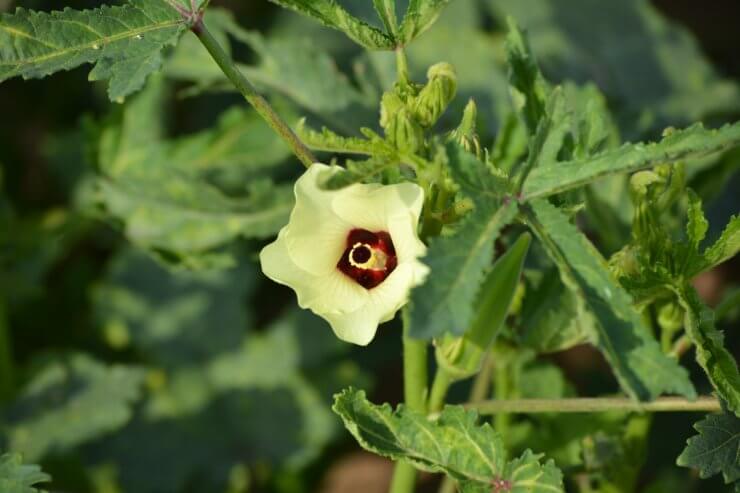
Flowering okra plant
While okra is a drought-tolerant plant, it still appreciates about an inch of water a week. If your garden doesn’t get that much with natural rainfall, you’ll want to supplement it with periodic watering. Having a rain barrel on hand is helpful. But if you don’t want to hand water—or your garden is just too big for hand watering to be practical—considering a drip irrigation system or soaker hoses. Unless you’re a rain cloud, it’s better to water your okra at ground level. If you must water from above, do it early in the morning so the leaves have time to dry out. Remember, the hotter and drier your garden climate, the more frequently you’ll want to water.
Weeds are a bother. Get them out early. Watch out especially for morning glory vines; they’ll sneak in and throttle your plants if you’re not on guard. In general, loose tilling and pulling should take care of most weeds. And once the okra plants really start growing, they’re likely to shade out any remaining weeds. Including companion plants (basil, lettuce, marigolds) will deter weeds as well. If you don’t have companion plants, organic mulch can do double duty by deterring weeds and retaining moisture.
If you started off with the right soil composition, additional fertilization should not be necessary unless you have particularly heavy rains that could wash out some of the soil’s nutrients. In that case, apply a side dressing of balanced slow-release fertilizer. Just be sure not to apply too much nitrogen—it will foster prolific plant growth at the expense of flower and fruit.
Fertilize
If you haven’t done a soil test, we recommend that you start with a balanced, 10-10-10 fertilizer at a quantity of about 2 pounds per 100 feet of row and apply one or two side-dressings of 3 ounces per 100 feet of row when your okra plants are 6 to 8 inches tall, and again about two weeks later.
Be careful not to get fertilizer on the foliage. Apply the fertilizer between plants in beds and containers, and in the aisles between rows. Water in thoroughly. And be very careful of nitrogen: too much nitrogen can cause runaway growth in the plant and keep it from properly developing flowers and pods.
Water
Okra like about an inch of water a week. If they don’t get it from the sky, they need it from you. If you have a small okra plot, hand watering should do; just make sure it’s a good, solid soaking about once a week. If your garden’s bigger, consider setting up drip irrigation or soaker hoses. If you must use the trusty garden hose, water early in the morning to give the plant’s leaves plenty of time to dry off; the last thing you want to do is invite a fungal infection.
Apply mulch
Mulch isn’t strictly necessary with okra, but it can help deter weeds and retain moisture for the plants. But if you have companion plants like basil, lettuce, or marigolds, they may do some of the water retention and weed deterrence for you.
Remember that if you do apply mulch, make it organic, and keep it away from the base of the plants.
What do you do to keep your okra plants healthy and happy during their growing season? How often do you have to fertilize or water your okra plants? Please tell us your tips for nurturing healthy plants.


 Previous
Previous

